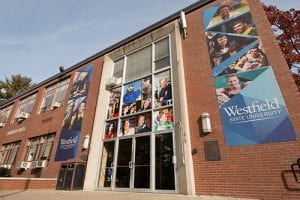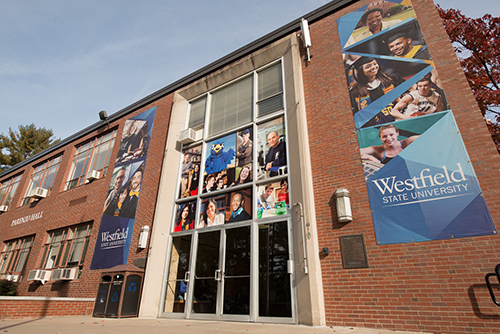By Ramon S. Torrecilha, Ph.D.

Parenzo Hall at Westfield State University. (WESTFIELD STATE UNIVERSITY PHOTO)
The renovation of a building on a college or university campus entails more than simply improving energy efficiency, upgrading facilities and amenities, and modernizing exterior and interior style. It consists of more than planning meetings and ribbon-cutting ceremonies. Key players aren’t only students, faculty, and staff; and architects, contractors, and construction workers.
All the above are essential to the process, of course, but when it comes to renovating a building on the campus of a public college or university, critical is the support of the local community. This is especially true if that renovation’s design features the embrace of external partnerships with industry so that the university could play a central role in growing the regional economy.
Nearly two years have passed and a significant amount of analysis and planning have taken place since a July 2018 campus visit from Massachusetts Governor Charlie Baker and Lt. Governor Karyn Polito included a ceremonial bill signing ensuring the necessary funding for the 64-year-old Parenzo Hall. The two top state officials were on hand to announce that the state was partially funding the $40 million building’s renovation project – news the Westfield State community is grateful for on an especially hot summer day that underscored the need for air conditioning, among other necessary amenity and system upgrades, in Westfield State University’s oldest, yet most heavily utilized buildings on campus.
Parenzo Hall has not been updated since its construction in 1956. It will be transformed into a modern campus hub that will enable our students to flex their innovative muscle and prepare for the jobs of the new economy. The multi-year construction phase will start in January 2021 and is scheduled to complete by fall 2023.
Among the Parenzo Hall’s highly anticipated enhancements will be the creation of two centers: The Laboratory for Collaboration (CoLab), and the Center for Student Success and Engagement. These new centers will be linked to offer students the opportunity to engage with industry professionals, work on real-world application of their knowledge and skill sets and explore career opportunities. CoLab will leverage technology to serve as a nexus for innovative collaboration in western Massachusetts, partnering with K–12 school districts, community colleges, and industry partners. It will teach students and community partners how to productively engage in online-hybrid environments that increase flexibility for students, facilitate co-enrollment, expand course choices, and provide a bridge to employment.
Meanwhile, the Center for Student Success and Engagement will be focused on student retention and graduation, so that we can help students achieve – for themselves and the economy that awaits them. Ninety-five percent of Westfield State students come from Massachusetts, and most remain in the Commonwealth after they graduate. It is incumbent upon us to be sure we are providing students with the skills they need to succeed in a rapidly advancing, technology-centered workforce.
Part of the proposal process for the new Parenzo included consulting with and garnering support from the business sector, community colleges, and K-12 school districts in western Massachusetts. It is with these organizations that Westfield State students will collaborate in our future CoLab to expand and strengthen community partnerships that align with Massachusetts’ workforce needs, to grow a skilled and knowledge-based workforce, and to spur and foster entrepreneurship in this region.
Westfield Superintendent of Schools Stefan Czaporowski shared with me his support of our project. The school district collaborates with the University via The Westfield Promise early college program, and its high school juniors and seniors take classes here and receive college credit for free. Superintendent Czaporowski noted in his letter of support that “our region is in need of both a programmatic leader and common location to bring current disparate efforts to bolster career pathways, educational access, and industry support in one arena.” CoLab “will fill that leadership void.”
Springfield School Superintendent Daniel J. Warwick echoed those sentiments. His letter of support underscored the attractive prospect of the activities to be offered in CoLab and that it is “sure to enhance student and teacher understanding of workforce development for career pathways and expanded higher education opportunities for students in the Springfield Public Schools. We are eager to work with you to build a better bridge between educational institutions and statewide industry leaders.”
He added: “Westfield State can serve as a programmatic leader in developing a college-going culture with a connection to career pathways. With the planned renovation of Parenzo Hall and the development (of CoLab), Westfield State will serve as a location to connect industry and education partners in real-time collaboration. We look forward to serving as a partner in this set of activities which will be critical to the economic development of western Massachusetts.”
Through CoLab, the local community colleges – Berkshire, Greenfield, Holyoke, and Springfield Technical – will also continue their partnership with Westfield State, which will ease the transfer process by offering financially supported, hybrid-style programs and boot camps.
Westfield State will work with chambers of commerce and economic development boards to broker relationships, inform curriculum, and secure support. With the establishment of CoLab, Greater Westfield Chamber of Commerce Executive Director Kate Phelon offered her support by explaining that Westfield State is “pioneering the way for our future workforce, encompassing students from K-12. Students who want to, or those who didn’t think possible, will be provided an opportunity to pursue a college pathway or engage in entrepreneurship, with state-of-the-art technology and with collaborations that do not yet exist.”
Let’s remember that Massachusetts leads the way for innovation, technology, and entrepreneurship. Parenzo Hall’s renovation will meet the needs of students, faculty, and administration to address Massachusetts’ workforce issues, which, in turn, feeds the business community.
On that hot summer day in 2018, when we saw with our own eyes that Parenzo’s renovation would finally proceed, it was the words of Lt. Gov. Polito that summed up what this project is all about: “A modernized Parenzo Hall will help prepare a new generation of Westfield students to join the workforce, and is an important investment in the region and in the Commonwealth’s future overall.”
Ramon S. Torrecilha, Ph.D., is president of Westfield State University.








